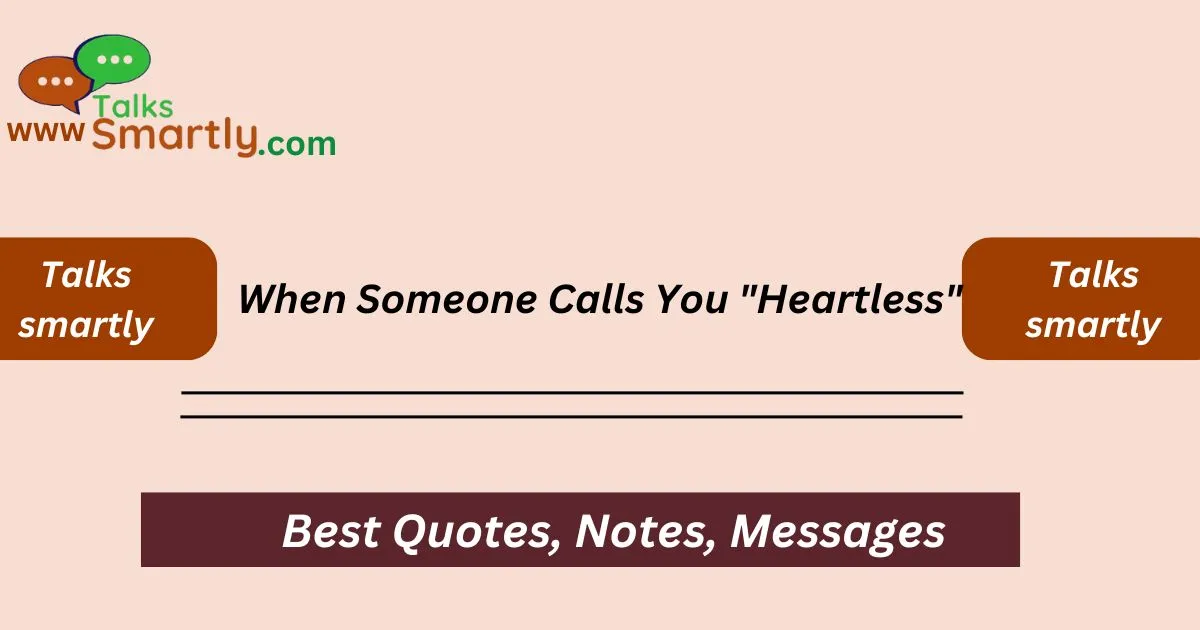“Learn how to handle being called “heartless” with these thoughtful and effective responses.”
Being called “heartless” is a tough accusation to face, especially when it’s unexpected or undeserved. This term can make us feel misunderstood, hurt, or defensive. Whether it comes during a heated argument or a simple disagreement, knowing how to respond calmly and wisely can defuse the situation and help others understand your true intentions.
In this blog post, we will explore 35 of the best responses when someone calls you “heartless.” These responses will help you defend yourself without escalating the tension, turning a hurtful remark into an opportunity for better understanding. You’ll be ready to maintain your composure and avoid conflict.
This list of responses is designed for various scenarios. Whether the comment was made out of anger, frustration, or a misunderstanding, you will find ways to respond that are both assertive and thoughtful. From witty comebacks to heartfelt explanations, you’ll have the tools to address the situation head-on without letting it affect your self-worth.
35 Best Responses When Someone Calls You “Heartless”
- I’m sorry if I came across that way.
- I care more than you think.
- I don’t think that’s fair.
- I’m just trying to be rational right now.
- That’s not true, but I can see why you might feel that way.
- I’m sorry you feel hurt, but that doesn’t make me heartless.
- I care deeply, but I handle things differently.
- I’m being practical, not unfeeling.
- I may not show it, but I do care.
- I don’t express my emotions the same way you do.
- I’d like to understand why you feel that way.
- That’s not a label I accept.
- I’m sorry if my actions hurt you, but that’s not who I am.
- I didn’t mean to upset you.
- I’m doing what I believe is right.
- I’m focused on the bigger picture.
- I have empathy, but I’m also realistic.
- I’m not cold-hearted, just cautious.
- I care, but I’m not going to react emotionally right now.
- I express myself differently, but that doesn’t mean I don’t feel.
- I think it’s important to stay objective here.
- I care about you, but I also need to be honest.
- I understand your perspective, but I see things differently.
- I’m sorry you feel that way, but I have my reasons.
- I’m just handling the situation the best way I can.
- It’s not about being heartless, it’s about being practical.
- I’m focusing on the solution, not the emotions.
- It’s important to stay calm and not let emotions take over.
- I’m doing my best to balance the facts and the feelings.
- Just because I’m not emotional doesn’t mean I don’t care.
- I’m trying to stay strong for everyone involved.
- My priority is to resolve the issue, not let emotions cloud my judgment.
- I care about the outcome, and that’s what I’m focused on.
- I’m doing what needs to be done, even if it’s hard.
- I’m not heartless—I’m just prioritizing what’s important.
1. “I’m sorry if I came across that way.”
This response is a calm and collected way to acknowledge their feelings without taking blame for something you didn’t do.
Example: If a friend accuses you of being heartless after a disagreement, you could say, “I’m sorry if I came across that way. That wasn’t my intention at all.”
2. “I care more than you think.”
This reply offers a gentle reminder that their accusation may be misinformed, encouraging them to reconsider their view of you.
Example: After being called heartless for not reacting emotionally, respond with, “I care more than you think, I just express it differently.”
3. “I don’t think that’s fair.”

By calmly stating that the label is unfair, you can open the door to a more balanced conversation about what’s really going on.
Example: If someone says you’re heartless during an argument, reply, “I don’t think that’s fair—let’s talk about what’s really bothering you.”
4. “I’m just trying to be rational right now.”
Sometimes, being practical or logical is mistaken for being emotionless. This response clarifies your approach.
Example: If you’re being calm in a stressful situation, and someone accuses you of being heartless, respond, “I’m just trying to be rational right now to solve the issue.”
5. “That’s not true, but I can see why you might feel that way.”
This is a diplomatic response that validates their emotions while standing firm on your own perspective.
Example: If a partner calls you heartless for not agreeing with them, say, “That’s not true, but I can see why you might feel that way.”
6. “I’m sorry you feel hurt, but that doesn’t make me heartless.”
This clear yet respectful response defends your position while acknowledging the other person’s feelings.
Example: If someone calls you heartless after a tough decision, reply, “I’m sorry you feel hurt, but that doesn’t make me heartless—I’m trying to do what’s right.”
7. “I care deeply, but I handle things differently.”
This response explains that your actions or reactions may not align with their expectations, but it doesn’t mean you’re uncaring.
Example: If a coworker accuses you of being heartless because you didn’t get emotional about an issue, respond, “I care deeply, but I handle things differently.”
8. “I’m being practical, not unfeeling.”
This response distinguishes between being heartless and being pragmatic, especially in stressful or complex situations.
Example: In a workplace setting, if you’re called heartless for focusing on the facts, you could say, “I’m being practical, not unfeeling—it’s important to stay focused.”
9. “I may not show it, but I do care.”
This is a simple, straightforward way to clarify that your care is real, even if it’s not visible.
Example: If a family member calls you heartless for not reacting emotionally, say, “I may not show it, but I do care—just in my own way.”
10. “I don’t express my emotions the same way you do.”
People express emotions differently, and this response helps remind the other person that your style doesn’t mean you lack empathy.
Example: If a friend accuses you of being heartless after you stay calm in a heated conversation, respond, “I don’t express my emotions the same way you do, but I still feel them.”
11. “I’d like to understand why you feel that way.”
This opens the conversation for further discussion and shows that you’re willing to address their concerns.
Example: If someone calls you heartless after you disagree with them, say, “I’d like to understand why you feel that way—can we talk about it?”
12. “That’s not a label I accept.”
Firmly stating that you reject the accusation can immediately put a stop to further insults or unfair judgments.
Example: If someone calls you heartless in anger, respond confidently with, “That’s not a label I accept—I know who I am.”
13. “I’m sorry if my actions hurt you, but that’s not who I am.”
This response separates your actions from your character, making it clear that any hurt wasn’t intentional.
Example: If a partner calls you heartless during an argument, say, “I’m sorry if my actions hurt you, but that’s not who I am.”
14. “I didn’t mean to upset you.”
Sometimes, a simple apology for any unintended hurt is enough to calm the situation.
Example: If a friend calls you heartless for a comment you made, respond with, “I didn’t mean to upset you—I’m sorry if I did.”
15. “I’m doing what I believe is right.”
Standing by your principles, even when others disagree, can sometimes lead to accusations of being heartless. This response addresses that.
Example: If someone criticizes a difficult decision you made, say, “I’m doing what I believe is right—it doesn’t mean I don’t care.”
16. “I’m focused on the bigger picture.”
If you’re making decisions with long-term benefits in mind, this response can help explain your perspective.
Example: In a workplace setting, if someone calls you heartless for a strategic decision, say, “I’m focused on the bigger picture, which I believe will benefit us all.”
17. “I have empathy, but I’m also realistic.”
Balancing empathy and practicality can sometimes be misinterpreted. This response clarifies that you can do both.
Example: If a friend calls you heartless for not indulging in emotional reactions, respond with, “I have empathy, but I’m also realistic about what can be done.”
18. “I’m not cold-hearted, just cautious.”
This response helps clarify that your reserved nature doesn’t mean you lack feelings.
Example: If someone accuses you of being heartless for being distant, say, “I’m not cold-hearted, just cautious with how I express myself.”
19. “I care, but I’m not going to react emotionally right now.”
This is a clear way to explain that your calm reaction doesn’t equate to not caring.
Example: If someone calls you heartless in a tense situation, say, “I care, but I’m not going to react emotionally right now.”
20. “I express myself differently, but that doesn’t mean I don’t feel.”
This response reminds the other person that different emotional expressions don’t indicate a lack of feeling.
Example: If someone calls you heartless for being composed in a difficult moment, say, “I express myself differently, but that doesn’t mean I don’t feel deeply.”
Replies to “I’ve Seen You Somewhere”
21. “I think it’s important to stay objective here.”
In situations where emotions run high, staying objective is often seen as a lack of care. This response addresses that.
Example: In a debate or discussion, if someone accuses you of being heartless, reply, “I think it’s important to stay objective so we can solve the issue.”
22. “I care about you, but I also need to be honest.”
Balancing care with honesty can sometimes be difficult, but this response shows that both are possible.
Example: If someone calls you heartless for being direct, say, “I care about you, but I also need to be honest.”
23. “I understand your perspective, but I see things differently.”
This respectful response acknowledges the other person’s feelings without agreeing with their accusation.
Example: If someone calls you heartless during an argument, say, “I understand your perspective, but I see things differently.”
24. “I’m sorry you feel that way, but I have my reasons.”
This response validates their feelings but also reinforces your own stance or decision.
Example: If someone calls you heartless after you make a tough choice, say, “I’m sorry you feel that way, but I have my reasons.”
25. “I’m just handling the situation the best way I can.”
This response clarifies that your actions are based on your understanding of what’s best, even if it’s not what they expected.
Example: If someone calls you heartless for being pragmatic, respond, “I’m just handling the situation the best way I can.”
26. “It’s not about being heartless, it’s about being practical.”
This response reframes the situation, showing that your approach is grounded in logic, not a lack of empathy.
Example: If a colleague calls you heartless during a decision-making process, reply, “It’s not about being heartless, it’s about being practical to reach the best outcome.”
27. “I’m focusing on the solution, not the emotions.”
This is a good response for situations where you’re working toward resolving an issue, and emotions are running high.
Example: In a professional setting, if someone accuses you of being heartless, say, “I’m focusing on the solution, not the emotions, to make progress.”
28. “It’s important to stay calm and not let emotions take over.”
This response highlights that staying calm in the face of a difficult situation doesn’t mean you lack care or compassion.
Example: If a friend calls you heartless for not reacting emotionally, say, “It’s important to stay calm and not let emotions take over, especially now.”
29. “I’m doing my best to balance the facts and the feelings.”
This response shows that you’re considering both sides, but focusing on what’s necessary to move forward.
Example: If someone calls you heartless during a decision-making process, reply, “I’m doing my best to balance the facts and the feelings in this situation.”
30. “Just because I’m not emotional doesn’t mean I don’t care.”
This is a straightforward and clear response that separates emotional expression from actual caring.
Example: If someone accuses you of being heartless after you handle something calmly, say, “Just because I’m not emotional doesn’t mean I don’t care.”
31. “I’m trying to stay strong for everyone involved.”
Sometimes people mistake strength for heartlessness. This response clarifies your intention to support others.
Example: If someone calls you heartless during a family crisis, respond, “I’m trying to stay strong for everyone involved—it’s not easy.”
32. “My priority is to resolve the issue, not let emotions cloud my judgment.”
This response works well in high-stress or critical situations where you need to remain focused.
Example: If a coworker calls you heartless during a tense meeting, reply, “My priority is to resolve the issue, not let emotions cloud my judgment.”
33. “I care about the outcome, and that’s what I’m focused on.”
This response shows that you care, but you’re more focused on achieving the best result rather than reacting emotionally.
Example: If someone calls you heartless during a project, say, “I care about the outcome, and that’s what I’m focused on right now.”
34. “I’m doing what needs to be done, even if it’s hard.”
This response addresses the difficulty of the situation and the fact that hard decisions don’t equate to heartlessness.
Example: If someone accuses you of being heartless after you make a tough decision, respond with, “I’m doing what needs to be done, even if it’s hard.”
35. “I’m not heartless—I’m just prioritizing what’s important.”

This is a simple yet strong statement that refutes the accusation and shows that you’re making decisions based on priorities, not emotions.
Example: If a friend calls you heartless after you make a difficult choice, say, “I’m not heartless—I’m just prioritizing what’s important for everyone involved.”
ANSWER TO KEY QUESTION
1.How do I respond when someone calls me heartless in the heat of the moment?
Stay calm and give a response that acknowledges their feelings without escalating the situation.
2.Is it okay to defend myself when someone calls me heartless?
Yes, it’s important to stand up for yourself. Respond with a calm and thoughtful explanation of your actions or feelings.
3.What if I feel misunderstood?
Explain that your behavior or decisions are often misinterpreted and offer to clarify your intentions.
4.Should I just ignore it when someone calls me heartless?
In some cases, ignoring the comment may be the best option, especially if the situation is too heated to address at the moment.
5.How can I explain that I’m not heartless but just more practical?
Use responses that explain the difference between being logical or rational and lacking empathy, such as, “I’m just trying to be practical and not let emotions cloud my judgment.”
Conclusion
Being called “heartless” can be a harsh and painful accusation, but it doesn’t have to define you. The best way to handle such a situation is by responding with calmness, clarity, and confidence. The 35 responses outlined in this post offer a variety of ways to defuse tension, defend your character, and clarify misunderstandings.
By using these thoughtful and measured responses, you can maintain your integrity while ensuring that your true feelings and intentions are understood.

Hi, I’m Lauren Reynolds, owner of Talks Smartly.
We specialize in wishes, thank you messages, and thoughtful responses for all occasions.
Whether it’s a birthday wish or a heartfelt thank you, we’re here to make your messages shine.
Join us at Talks Smartly and let your words leave a lasting impression.”











